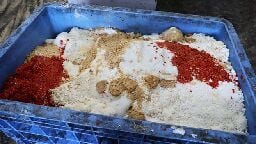Japan is recycling food waste back into food with fermentation



…
Japan's small size and mountainous terrain present challenges for food self-sufficiency. The country imports almost two-thirds of its food and three-quarters of its livestock feed. Yet each year, Japan throws out 28.4 million tonnes of food – much of it edible.
This comes with steep environmental and economic costs. Compared to many countries, consumers in Japan pay higher prices for food because so much of it is imported. And they also pay taxes to cover the majority of the 800bn yen (£4.2bn/$5.4bn) the country spends each year on waste incineration. Food makes up about 40% of the rubbish that Japan incinerates, and incineration produces significant air pollution and greenhouse gas emissions.
As the world's fifth-largest emitter of greenhouse gases, Japan has set goals of cutting emissions by 46% by 2030 and becoming fully carbon neutral by 2050. Tackling food wastewill have to be a part of those efforts, Takahashi says.
Feeding food scraps to pigs, what a novel idea!
Wouldn't the pigs get sick?
Unlikely, pigs are omnivores, their stomachs are iron
Humans are also omnivores though, pigs must be different in another important way
True, but humans are like the shittiest omnivores. They need to cook their food to digest it properly. Pigs have no such weakness, they root around in the dirt and eat whatever they find with no issue.
Oh yeah. Obligate "cooked food"ivores
Other than the cooking thing, which is more us understanding it's better for us than a hard requirement, humans are actually amazing omnivores. Dogs and wolves are some of our closest competitors there and we're still miles ahead.
Okay, but are we amazing in that we can eat almost anything that is clean and fresh, or that we can handle unclean things filled with bacteria/ other unpleasantness?
My impression is that it's the first, we can have a very varied diet unlike most other animals who are a bit more specialised (or in some cases very specialised), but my dog regularly eats things that would turn my stomach inside out.
Yeah but no one gives a fuck about their health so long as taste is fine and price is cheap
Ignoring even any ethical concerns, that's just not true. Livestock is something that commercial farmers do not want to be unhealthy because it creates costs, problems, and spreads.
Death is famously the peak of health
At slaughter, it stops being a hog and starts being pork but, whilst there are other bacterial and similar concerns, it isn't being fed anymore at that point.
Before slaughter, some farmers sell feeder pigs for other people to raise until slaughter. In order to get paid, no one in that chain wants to actively harm their health if only because it impacts their bottom line.
A non-animal way of looking at it would be producing mushrooms on some media. If I could safely and effectively grow my mushrooms on a medium that recycles something without otherwise damaging them on cheaper/greener material, why wouldn't I do that? Conversely, why would I if that material ended up costing me more in the long run by stunting growth or something?
Based and solarpunk pilled.
My mom actually made us clean our plate (eat it all) because there were starving children in China.
It was a different time.
there are a lot of starving children in China being permanently affected by perpetual malnutrition and starvation.
https://www.wfp.org/countries/china
this article is about Japanese food waste innovation, btw, not Chinese.
I mean, I think the poster's point was that they had no leftovers because their parents forced them to eat it all with the given excuse. I had the same thing growing up.
That's pretty cool. They say it produces good pork, I wonder how the pigs feel about it vs other feed.
They asked one of the pigs and it said it was OinK.
*buu buu
(they are Japanese picks and thus speak Japanese) ;)
If watching youtubers who raise hogs is any indication, anywhere between not caring at all to being enthused. Hogs are really not picky about their food for the most part and it's not uncommon to add liquid to the feed in general.
Just in the last couple weeks I had beer and pasta which were made with recycled bread. I thought that was pretty cool.
It needs to be transformed? Most people I know just dump the scraps right into the pig trough.
Well, they do like their natto over there, so I’m confident they can find a way to stomach this.
You might've missed a detail.
So what you're saying is Japanese cops get free food?
Haha. You're right. I totally missed that. Try natto some time, though.
I recently tried it and thought it was great! I'm a big fan of funky fermented foods though.
Also: https://mander.xyz/c/fermentation
Yeah my wife loves natto. I don’t mind the taste at all, but the texture is like a mouthful of snot and I can’t get over it.
I can eat it, at least the cut, less slimy type, but I still don't like it and no amount of trying it over the years has changed that. Even dried natto as a snack nearly made me gag because my body is just screaming "this is too much rot" no matter what I tell it.
EAT RECYCLED FOOD
KambuchaKompostbucha ✨
Wait? Japan pays high prices for food? It was mind bogglingly cheap when I was there.
They've been doing this in Korea for more than a decade. It's a bit annoying being mandated to throw your food scraps out separately, but it's good to know the refuse is reused.
::: spoiler BBC News - News Source Context (Click to view Full Report) Information for BBC News:
::: spoiler Search topics on Ground.News https://www.bbc.com/future/article/20240816-the-japanese-farms-recycling-waste-food ::: Media Bias Fact Check | bot support